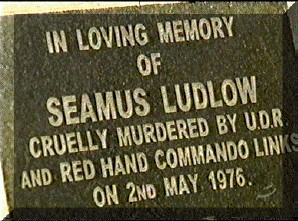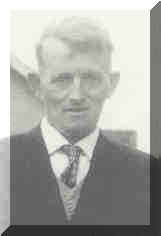


The Murder of Seamus Ludlow in County Louth, May 1976. Towards a public inquiry?
|
The Murder of Seamus Ludlow in County Louth, May 1976. Towards a public inquiry? |
|
|
The Irish Examiner, 4 November 2005: Report critical of handling of Ludlow case By Shaun Connolly Political Correspondent
The Irish Examiner, 4 November 2005: 'We think this goes right to Cabinet level' by John Breslin The family of Seamus Ludlow believes political decisions taken at the highest level led to a block being placed on any further investigation into the 1976 murder. Gardai had the names and details of the four men, two of them members of the British security forces, in January 1979. Preliminary arrangements were made to interview at least one of them but nothing further happened. Jimmy Sharkey, Mr Ludlow's nephew, said what was new in the report was seeing in black and white suspicions that the family have held for years. "We suspected it had been suppressed at a very high level. But we don't think it stops at Lawrence Wren," said Mr Sharkey. "He was only doing what he was told. We think this goes right to Cabinet level." Mr Justice Barron cites various reasons why gardai did not pursue the suspects and sit in on interviews. In part, there was a fear the Irish Government would be forced to buckle under the pressure from the British for "greater co-operation", including allowing RUC officers to travel south to interview republican suspects. However, Mr Sharkey goes further, claiming there must have been some agreement at the highest political level to "close the lid" on murders and atrocities that took place for a period during the 70s. "There were mysterious murders and bombings and it all happened from 1973 to 1977. This is not just about the murder of Seamus Ludlow, this has ramifications for the Dublin/Monaghan bombings and others," said Mr Sharkey. The family does not believe the RUC were greatly interested in pursuing the four main suspects, one of whom is suspected of being an agent. "I doubt it very much," said Mr Sharkey. While the RUC did hand over the names and details, it was 19 months after the Northern security forces first knew them, at a time when pressure for co-operation was at its height. Preliminary arrangements were made for gardai to interview Paul Hosking. However, when there was no movement from the south, the RUC did not make any attempt to interview the suspects.
I
Homepage
I I Top
I I Press
Coverage I I Barron
Inquiry I I Terms
of reference for Barron Inquiry I I Barron
Report is Published I I Fresh
Inquest I I Celtic
League Support I I New
GuestMap Guest Book.
I Visit The Irish News; The Argus Copyright © 2005 the Ludlow family. All rights reserved. Revised: November 19, 2005 .
|